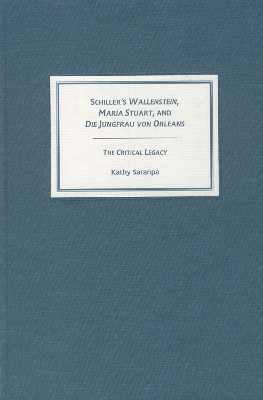Changing perceptions about history necessarily color the critical reception of historical plays, not only in terms of expectations regarding historical accuracy, but also in judgments about the value and suitability of historicalmaterial for the stage. The German playwright, poet, and philosopher Friedrich Schiller (1759-1805), often called the father of modern German drama, broke new ground with his late historical plays -- the Wallenstein trilogy, Maria Stuart, and Die Jungfrau von Orleans -- and they have thus generated a continuous stream of criticism since their appearance in the early nineteenth century. In this book Kathy Saranpa maps out three relatedstrands: the reception history of Schiller's late historical plays; the changing view of history, from the notion of Universalgeschichte propounded by Herder to the American New Historicism; and the changing status of the genre of the historical drama. The juxtaposition of these three strands will interest scholars of German literature; readers from other fields will appreciate the book's value as an introduction to the work of an often misunderstood but vastly important figure in German belles lettres and philosophy.
Kathy Saranpa received her Ph.D. in German literature from Yale University, and has taught at the universities of Wisconsin and Oregon.
- ISBN10 1571131558
- ISBN13 9781571131553
- Publish Date 15 January 2002
- Publish Status Active
- Publish Country US
- Publisher Boydell & Brewer Ltd
- Imprint Camden House Inc
- Format Hardcover
- Pages 179
- Language English
